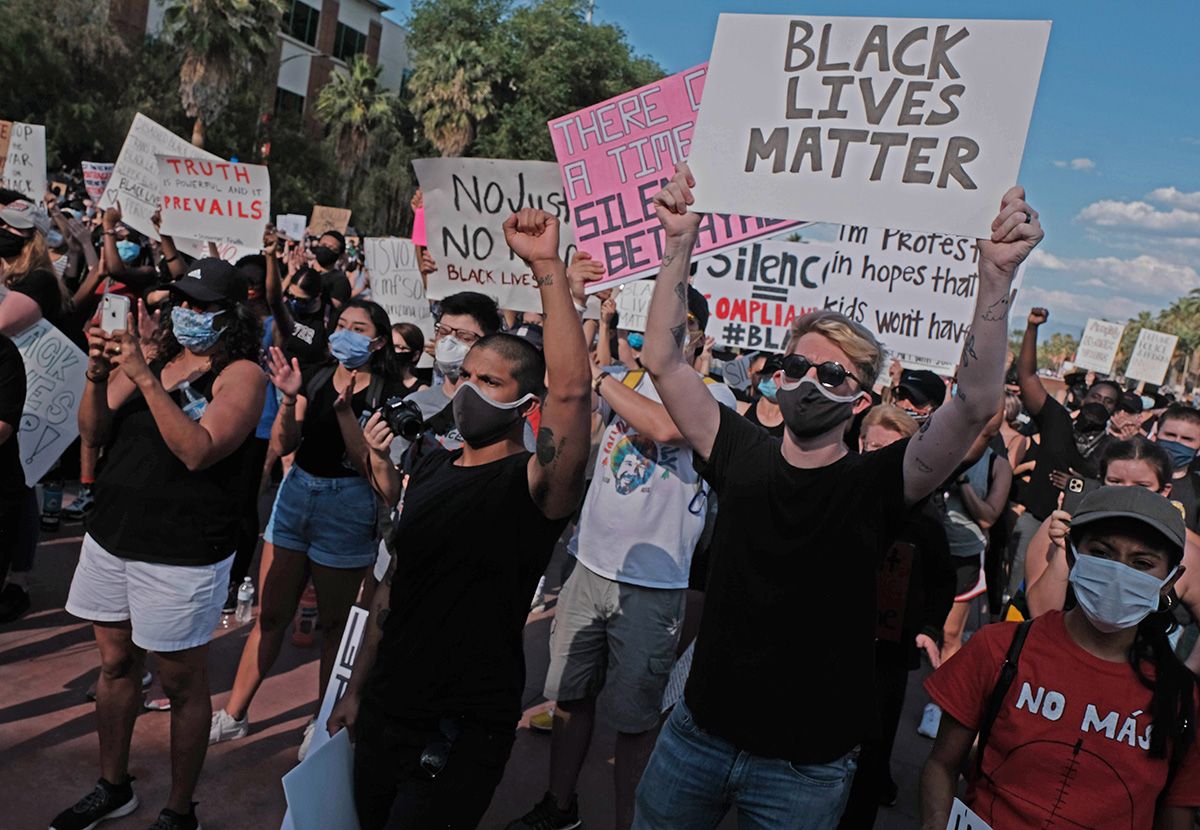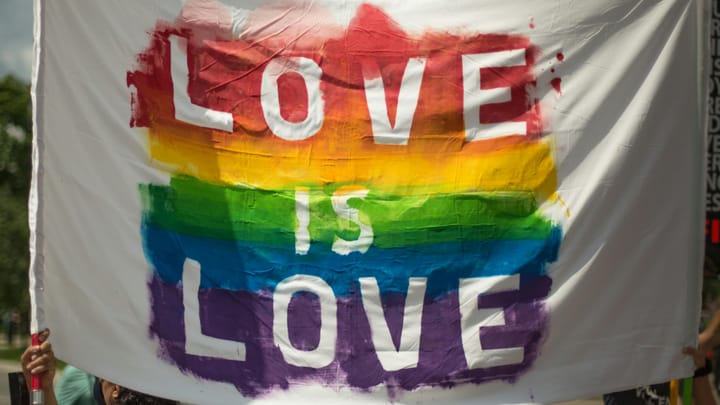Is American ‘woke’ culture progressive or regressive?

A few minutes every morning is all you need.
Stay up to date on the world's Headlines and Human Stories. It's fun, it's factual, it's fluff-free.
Amid the strong public response to the death of George Floyd, a black man murdered at the hands of a white police officer in Minneapolis, there has been a renewed debate around what is colloquially known as “woke culture.”
According to the Merriam Webster dictionary, woke is defined as an American slang term explained as someone who is “aware of and actively attentive to important facts and issues, especially issues of racial and social justice.”
Within certain sectors of the American left, to be woke is to possess a quality of being that helps one to stay aware of social and racial inequalities, which for some is an essential platform for viewing Western – and especially American – history, society and culture.
Gloria Watkins is an American author, activist and professor who is also known by her pen name, bell hooks. For Watkins, the intersections of race, gender and power are the dominant forms which animate American society. In her view there are “interlocking systems of domination that define our reality,” including white supremacy, imperialism, capitalism and patriarchy, which are encompassing and cannot be ignored.
Detractors, who don’t necessarily all fall into the category of traditional conservatives, but also centrists and sometimes fellow progressives, have other views on “wokeness.”
Some conservatives and centrists have criticized woke culture for allegedly focusing too much on race and identity in diagnosing America’s social ills and possible ways forward.
While it isn’t uncommon for conservatives with reactionary tendencies to respond to an emphasis on social and racial inequalities with disdain, in turn belittling the “woke” worldview as overly sensitive or fragile, others employ good-faith arguments to criticize what they see as excesses in woke culture.
For New York Times columnist David Brooks, who has been described as a moderate conservative, the problem with wokeness isn’t so much that race and social inequality are part of the conversation but that both race and inequality can sometimes be claimed as the only lens with which to view important political and social issues, leading to a pessimistic outlook that makes it more difficult to implement solutions.
“The greatest danger of extreme wokeness is that it makes it harder to practice the necessary skill of public life, the ability to see two contradictory truths at the same time,” Brooks argues, using the example that one can hold the view that racism is the “great sin” of America while also acknowledging the broad swathes of people who have come together over the generations to help end it.
Former President Barack Obama has made similar arguments.
“This idea of purity and you’re never compromised and you’re politically woke, and all that stuff, you should get over that quickly,” Obama said at the 2019 Obama Foundation summit in Chicago.
“The world is messy. There are ambiguities,” he added.
“Redefining racism”
As arguments surrounding race, culture and privilege heat up in response to repeated deaths of minorities at the hands of police, some are pushing to incorporate more race and identity considerations into social life.
According to Ibram X. Kendi, a bestselling author and the director of Boston University’s upcoming Center for Antiracist Research, racism itself, not merely race, is the defining aspect of American life and society.
In Kendi’s view, racist ideas aren’t just unfounded beliefs based on ignorance and hatred, but instead “were devised and honed by some of the most brilliant minds of each [American] era,” leading to “deeply entrenched discriminatory policies” and racial disparities.
Kendi’s newest book, Antiracist Baby, a picture book for children, hopes to provide “the language necessary to begin critical conversations [on racism] at the earliest age.”
Critics of Kendi’s views say that his arguments fail to give any weight to the impact of personal choices.
“Kendi’s position has radical implications,” writes Kelefa Sanneh, an American journalist. “In ruling out criticism of black culture or black behavior, it stipulates that any problems must be either fictional or the result of contemporary discrimination.”
Kendi emphasizes the need to “judge unfair policies, while refusing to judge, as a group, the people who are subjected to them,” Sanneh adds, suggesting that this argument is problematic.
“Afraid to look at your power”
Other adherents to woke philosophy argue that many of the people who critique it – most particularly white men – dislike the emphasis on race and privilege simply because they are the ones who benefit from an uncritical view of these systems.
“Ultimately, [white people] don’t want to hear about “white privilege” because it makes visible what has always been hidden – their power – and forces them to justify it. Power is nice, and liberating, and those who have it tend not to give it up without a fight,” argues Ellie Mae O’Hagan, a journalist with The Guardian.
Critics say that these arguments undervalue the social and economic inequalities found among white demographic populations, which is one of the reasons why a segment of these voting blocs in the West have veered toward right-wing populist platforms, such as in the case of Donald Trump in the US or Brexit in the United Kingdom.
“There should be an equal treatment of groups in the cultural sphere. There’s no question whites are advantaged economically, politically,” argues Eric Kaufmann, a political science professor at Birkbeck College, University of London.
“But in the cultural sphere, on immigration, the group whose numbers have declined, or who experienced a more rapid sense of change and loss due to migration, are the white majority.”
Kaufmann goes on to state that some conservatives sense a double standard when talking about the politics of race and ethnic identity in the West.
“[Identity politics] is seen as toxic, as expressed by a majority group, but when minorities express these interests, that’s seen as quite normal.”
The human condition?
In the aftermath of the death of George Floyd, Americans’ views on matters relating to race and power seem to be shifting. In a Monmouth University poll conducted in early June, 76% of Americans – and 71% of white respondents – called racism and discrimination “a big problem” in the United States, a 26-point increase over polling on the issue from 2015.
Similarly, 49% of white respondents said that police are more likely to use excessive force against a black culprit, compared to just 25% who believed this in 2016. This data has led the director of the Monmouth Polling Institute, Patrick Murray, to say that Americans seem to have reached a “turning point” on the issue of race in the country.
While many hail these changes in perspective as potential markers of progress in addressing racial disparities, there are also those who worry that identity and race are becoming overemphasized in the public consciousness.
Sam Harris, an American philosopher and neuroscientist, has argued that “We [American or Western society] have to break the spell that the politics of identity has cast over everything.”
Thomas Chatterton Williams, an American journalist and author of the book “Self Portrait in Black and White: Unlearning Race,” agrees. In his view, despite the history, humans have the capability of transcending race.
“The problem of racial difference in America – and in modern life more broadly – is always presented as an economic, political, biological or cultural problem. But I want to say that it’s at least as much a philosophical and imaginative disaster,” Williams writes.
Have a tip or story? Get in touch with our reporters at tips@themilsource.com




Comments ()